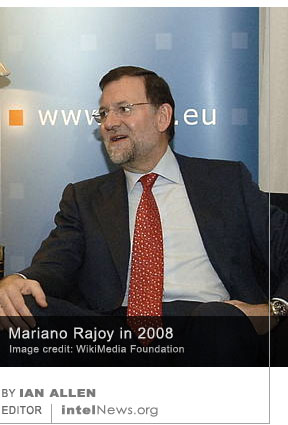Spain’s former prime minister denies knowledge of high-level spy operation
December 14, 2021 Leave a comment
 SPAIN’S FORMER PRIME MINISTER, Mariano Rajoy, has denied knowledge of an alleged spy operation that prosecutors say is connected to one of the most extensive corruption scandals in Spanish political history. The alleged spy scandal relates to what is known in Spain as the Gürtel case, which centers on an extensive network of tax evasion, bribery and money laundering. The Gürtel case brought together leading business executives, criminal kingpins, and senior politicians from Rajoy’s conservative Partido Popular (PP).
SPAIN’S FORMER PRIME MINISTER, Mariano Rajoy, has denied knowledge of an alleged spy operation that prosecutors say is connected to one of the most extensive corruption scandals in Spanish political history. The alleged spy scandal relates to what is known in Spain as the Gürtel case, which centers on an extensive network of tax evasion, bribery and money laundering. The Gürtel case brought together leading business executives, criminal kingpins, and senior politicians from Rajoy’s conservative Partido Popular (PP).
In May of 2018, Spain’s highest criminal court, the Audiencia Nacional, ruled that senior PP officials had enriched themselves with kickbacks and bribes, and had laundered large sums of money with assistance from the criminal underworld. The scandal effectively brought an end to the government of Prime Minister Rajoy later that year, and has virtually annihilated the once robust electoral popularity of the PP.
In 2020, another side of the Gürtel case emerged, which became known as Operation KITCHEN. This refers to an espionage effort that targeted senator Luis Bárcenas, who also served as treasurer of the PP. It was discovered that Bárcenas had in his possession bookkeeping documents that shed light on a secret system for recording illicit bribes paid to PP administrators and senior party figures. For his implication in the Gürtel case, Bárcenas was eventually given a 33-year prison sentence, which he is currently serving.
It appears that, once senior PP executives realized that Bárcenas had these documents in his possession, and that he may share them with the authorities so as to secure a lighter prison sentence for himself, they allegedly set up an espionage operation aimed at preventing Bárcenas’ documents from ending up in the hands of the authorities.
On Monday, however, Rajoy, who served as prime minister from 2011 to 2018, claimed he had no knowledge of any espionage efforts undertaken against Bárcenas. Speaking before a parliamentary committee that is investigating Operation KITCHEN, Rajoy said he had nothing to do with the spy affair. He later told reporters: “I never had any knowledge of the existence of this operation […], so I gave instructions on something I knew nothing about? I don’t know what they [the committee] were looking for”. Rajoy also told the parliamentary committee: “I really don’t care what Mr. Bárcenas [and others implicated in the Gürtel case] might have said about me”.
The investigation into Operation KITCHEN continues.
► Author: Ian Allen | Date: 14 December 2021 | Permalink
 A court in Spain has begun to examine the findings of a long-running probe into an illegal network that spied on people in return for payments, which almost certainly implicates senior figures in the former governing party. The probe focuses on what is known in Spain as the Gürtel case, which is described by observers as one of the most extensive corruption scandals in Spanish political history. It centers on an extensive network of tax evasion, bribery and money laundering, which brought together leading business executives, criminal kingpins, and senior politicians from Spain’s conservative Popular Party (PP).
A court in Spain has begun to examine the findings of a long-running probe into an illegal network that spied on people in return for payments, which almost certainly implicates senior figures in the former governing party. The probe focuses on what is known in Spain as the Gürtel case, which is described by observers as one of the most extensive corruption scandals in Spanish political history. It centers on an extensive network of tax evasion, bribery and money laundering, which brought together leading business executives, criminal kingpins, and senior politicians from Spain’s conservative Popular Party (PP). The Russian government sent a team of spies to Ireland to monitor undersea fiber-optic cables, which enable communications traffic between North America and Western Europe, according to a new report. The spies were allegedly sent to Ireland by the Main Directorate of the General Staff of the Russian Armed Forces, which is known in Russia as GU, and formerly as GRU.
The Russian government sent a team of spies to Ireland to monitor undersea fiber-optic cables, which enable communications traffic between North America and Western Europe, according to a new report. The spies were allegedly sent to Ireland by the Main Directorate of the General Staff of the Russian Armed Forces, which is known in Russia as GU, and formerly as GRU. Spain’s second largest bank has been placed under investigation in connection with a probe into an illegal network that spied on scores of politicians, business executives, journalists and judges for over 20 years. The investigation centers on José Manuel Villarejo (pictured), a 67-year-old former police chief, who remains in pre-trial custody following his
Spain’s second largest bank has been placed under investigation in connection with a probe into an illegal network that spied on scores of politicians, business executives, journalists and judges for over 20 years. The investigation centers on José Manuel Villarejo (pictured), a 67-year-old former police chief, who remains in pre-trial custody following his  A judge in Spain has widened an investigation into an illegal network that spied on scores of politicians, business executives, journalists and judges for over 20 years, in return for payments by wealthy clients. At the center of the case is José Manuel Villarejo, a 67-year-old former police chief, who was arrested in November of 2017 for carrying out illegal wiretaps and remains in pre-trial custody. State prosecutors accuse Villarejo of running an illicit information-collection enterprise that violated the privacy of hundreds of unsuspecting citizens. The latter were targeted by corporate competitors and individual wealthy clients. Many of Villarejo’s targets were eventually blackmailed by the recipients of information collected by the former police chief and his network.
A judge in Spain has widened an investigation into an illegal network that spied on scores of politicians, business executives, journalists and judges for over 20 years, in return for payments by wealthy clients. At the center of the case is José Manuel Villarejo, a 67-year-old former police chief, who was arrested in November of 2017 for carrying out illegal wiretaps and remains in pre-trial custody. State prosecutors accuse Villarejo of running an illicit information-collection enterprise that violated the privacy of hundreds of unsuspecting citizens. The latter were targeted by corporate competitors and individual wealthy clients. Many of Villarejo’s targets were eventually blackmailed by the recipients of information collected by the former police chief and his network. Israeli officials have denied reports that the head of the country’s internal security service was asked by the prime minister to spy on the director of the Mossad intelligence agency and the head of the military. The denials were prompted by allegations that will be made in full on Thursday, when the latest installment of the investigative news program Uvda (Fact) will be aired on Israel’s Channel 12 television channel. According to the program, the Israeli Prime Minister Benjamin Netanyahu requested that the personal phones of senior Israeli security officials, including those of the heads of the Mossad and the military, be wiretapped for security reasons.
Israeli officials have denied reports that the head of the country’s internal security service was asked by the prime minister to spy on the director of the Mossad intelligence agency and the head of the military. The denials were prompted by allegations that will be made in full on Thursday, when the latest installment of the investigative news program Uvda (Fact) will be aired on Israel’s Channel 12 television channel. According to the program, the Israeli Prime Minister Benjamin Netanyahu requested that the personal phones of senior Israeli security officials, including those of the heads of the Mossad and the military, be wiretapped for security reasons. Four hidden communications-surveillance compartments which are believed to date back to the Cold War, have been found in one of the most prestigious hotels of the former Yugoslavia. The discovery was made during an extensive renovation project that was recently completed in the Hotel Jama. The hotel is located in the southeastern Slovenian city of Postojnska, near the Italian border. For over a century, Postojnska has been famous for its network of limestone caves, which are among the largest in the world. Eager to cater to Italian, Austrian and other Western tourists, the government of Yugoslavia began construction on Hotel Jama in 1969. The hotel opened its doors in 1971, amidst much publicity and fanfare. It eventually became known as one of the most luxurious hotels in the communist world.
Four hidden communications-surveillance compartments which are believed to date back to the Cold War, have been found in one of the most prestigious hotels of the former Yugoslavia. The discovery was made during an extensive renovation project that was recently completed in the Hotel Jama. The hotel is located in the southeastern Slovenian city of Postojnska, near the Italian border. For over a century, Postojnska has been famous for its network of limestone caves, which are among the largest in the world. Eager to cater to Italian, Austrian and other Western tourists, the government of Yugoslavia began construction on Hotel Jama in 1969. The hotel opened its doors in 1971, amidst much publicity and fanfare. It eventually became known as one of the most luxurious hotels in the communist world. Several former and current intelligence officers, including a former director of the national spy service, have appeared in court in Macedonia, accused of illegally wiretapping thousands of people on orders of the government. The wiretap scandal has sparked the deepest political crisis in the impoverished Balkan country, which has existed since declaring independence from Yugoslavia in 1991.
Several former and current intelligence officers, including a former director of the national spy service, have appeared in court in Macedonia, accused of illegally wiretapping thousands of people on orders of the government. The wiretap scandal has sparked the deepest political crisis in the impoverished Balkan country, which has existed since declaring independence from Yugoslavia in 1991.
 By JOSEPH FITSANAKIS | intelNews.org
By JOSEPH FITSANAKIS | intelNews.org








